A Brief Colonial History Of Ceylon(SriLanka)
Sri Lanka: One Island Two Nations
A Brief Colonial History Of Ceylon(SriLanka)
Sri Lanka: One Island Two Nations
(Full Story)
Search This Blog
Back to 500BC.
==========================
Thiranjala Weerasinghe sj.- One Island Two Nations
?????????????????????????????????????????????????Wednesday, September 30, 2020
‘No one cares’: Palestinian citizens decry Israeli inaction on gun violence
With casualties rising, Palestinian citizens of Israel say the police are refusing to address the root causes of crime and violence in their communities.
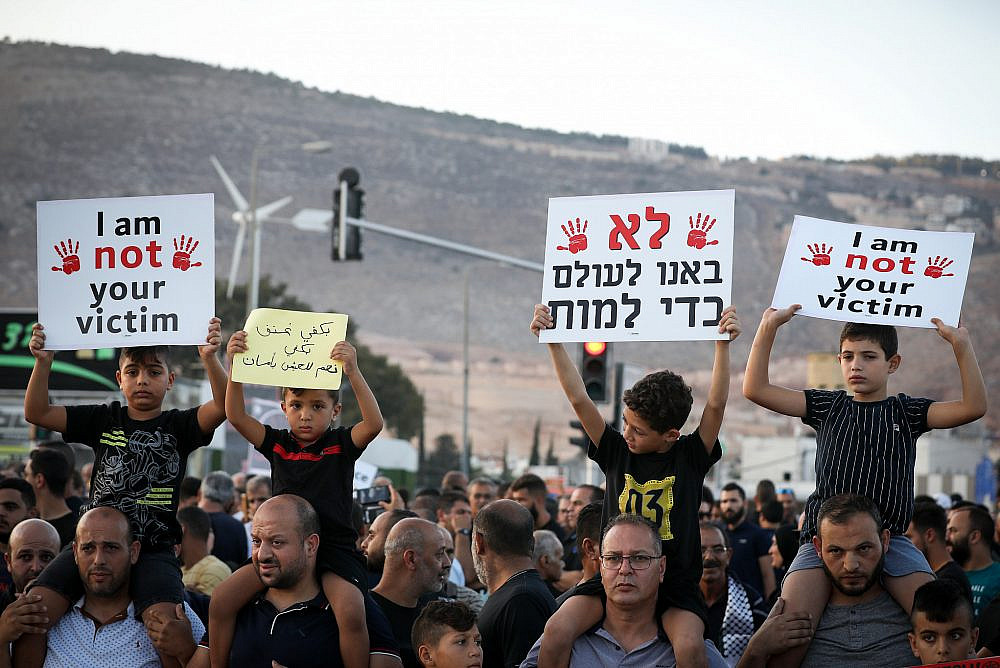 |
By Judith Sudilovsky -September 29, 2020
Sharifa Abu Muammar, a 30-year-old teacher, was supposed to start the school year with her 11th grade class on Sept. 1. She had spent the previous day decorating her classroom, located in the city of Ramle in central Israel, with a festive display of white and gold balloons, and sharing excited posts on social media.
But she never made it to the first day of class. The mother of three children, including a six-month-old baby, Abu Muammar was killed in her third-floor apartment by a stray bullet from a nearby gun fight between two rival gangs. With her death, the number of people killed by firearms in Arab towns and villages in Israel this year rose to 57.
“Sharifa was not killed by mistake,” says Basem Hatu, an attorney and resident of Ramle. “The mistake is that people have the courage to use guns freely in the streets, because the police do nothing to prevent it.”
Hatu blames the Israeli government for neglecting the Arab community. “Arab residents feel a lot of anger toward the legal authorities. They don’t even want to file complaints with the police, because the complaints are not dealt with as they should be. It’s clear to us that with all this killing, the police do not have the answer [to stop it]… My wife and I are afraid to go for a walk in the evening.”
A fifth of the state’s population, Palestinian citizens of Israel have long felt that they are living in a state of lawlessness in their communities, with the Israeli authorities doing little to curb organized crime and rampant illegal gun ownership. Following Abu Muammar’s death, the police swiftly arrested three young men in connection to the shooting — but for many in the community, this response is rare.
“We want the police to do what they are supposed to do: guarantee security for people and come down hard on the crime organizations in the same way they did in Israeli society in general,” says Joint List MK Aida Touma-Sliman. “No one can convince me that the police are unable to know where the illegal weapons are. If these weapons were, God forbid, intended to be used against Jews’ security or for nationalistic reasons, they would come to our villages and towns and destroy everything until they find them. But as long as these weapons are used only against us, it looks like no one cares.”
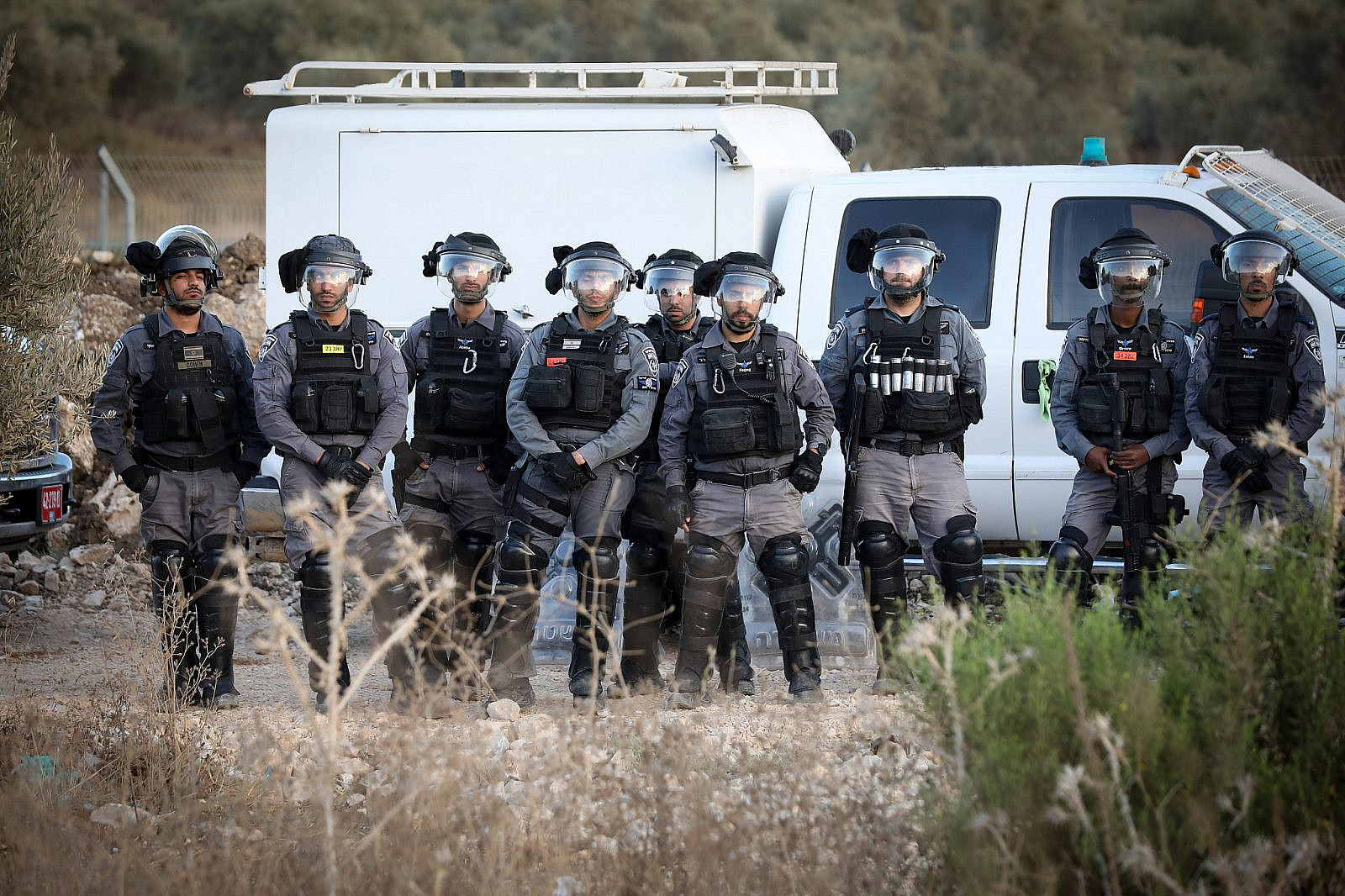 |
Israeli police at a protest of thousands of Palestinian citizens against violence, organized crime, and recent killings in their communities, in the Arab town of Majd al-Krum, northern Israel, October 3, 2019. (David Cohen/Flash90)
The police know who the crime families are, Touma-Sliman charges, but they choose to turn a blind eye. In fact, she adds, the police sometimes permit these families to accumulate more power, viewing them as potential partners that can conduct “sulhas” — resolutions to local conflicts — instead of relying on community elders.
The police, Touma-Sliman continues, “have always responded to our demands [to put an end to the shootings] by saying that this is part of our culture. Ten years ago we didn’t have this ‘culture’ — we didn’t have this number of people killed every year.”
Further rejecting the cultural argument, she points to the fact that the crime rates among Palestinians in the occupied West Bank and Gaza are nowhere near those in Israel. “This is not the culture. The only difference is the circumstances we live in and the authority which is responsible for our security.”
‘The number of victims keeps growing’
Abu Muammar is only one of the latest victims of this violence. Another Palestinian woman resident of Ramle, 48-year-old Intisar Issawi, was killed in May during a shooting allegedly intended for her son. In June, 28-year-old Khalil Khalil was shot in the back and killed as he left his house for work in the Halisa neighborhood of Haifa. In late August, 22-year-old Ashraf Abu Arar from Qalansuwa was killed in an apparent dispute between two families.
After a month without any arrests, Khalil’s mother Muna decided to take her son’s case to Israeli President Reuven Rivlin by organizing a “Mothers for Life March” in Jerusalem on August 11; she was joined by Touma-Suleiman, fellow Joint List MK Ayman Odeh, and a handful of other bereaved mothers. “Haifa is not quiet and I won’t be quiet,” said Muna. “The government still does not know who killed my son.”
Muna’s daughter, Marwa, contends that the police are well aware of an ongoing family feud involving her uncle and his wife’s family. Her brother was the victim of that escalating dispute, which she says he had nothing to do with, and which recently involved an arson attack on her grandfather’s car.
Seven people have been killed in their neighborhood in the past year and a half, Marwa adds, yet no arrests have been made in any of the cases.
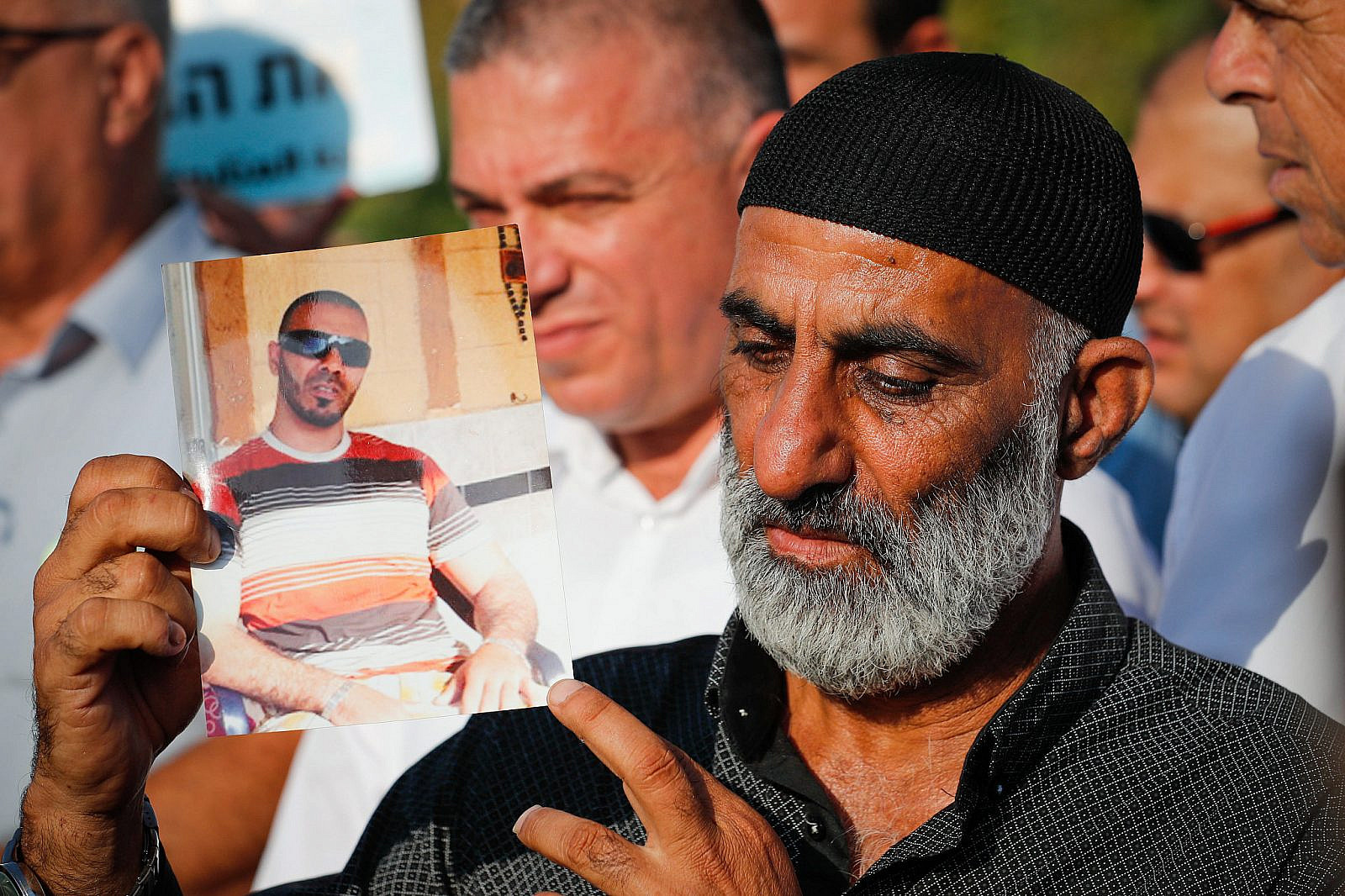 |
Palestinian citizens of Israel protest against violence, organized crime, and recent killings in their communities, outside the Prime Minister’s office in Jerusalem, October 10, 2019. (Yonatan Sindel/Flash90)
According to the 2019 “Personal and Community Security Index” by the NGO Abraham Initiatives, Palestinian Arabs constituted more than half of criminal deaths in the country in recent years, yet make up only 20 percent of Israel’s citizenry.
In 2018, Palestinian citizens accounted for 61 percent of all murder and manslaughter victims that year, with 71 people killed. That number jumped to 89 killed in 2019 — 65 percent of victims — the highest recorded since the state’s establishment. The number rises to 94 if Palestinians in occupied East Jerusalem, where Israel’s national police also operate, are included.
“The number of victims keeps growing, and we are getting closer to 100 people killed in a year. It has made the situation more urgent and more painful,” says Meissa Irsheid, the legal advisor for the Gun Free Kitchen Tables initiative of the Isha L’Isha Feminist Center, which advocates for disarmament and gun control. “The problem has been known by the authorities for a long time. In 2013 the police put the number of illegal, non-licensed weapons at 400,000 in all Arab communities in Israel. My assumption is that it is much higher today.”
It is therefore unsurprising that the 2019 index found that 60.5 percent of Palestinian citizens felt a sense of personal insecurity in their communities, compared to just 12.8 percent of Jewish-Israeli citizens. The index also found that 83 percent of Palestinian citizens regarded crime and violence as their highest concern, with 82 percent worried about shootings and the use of firearms.
Mistrust between community and police
This violence, activists argue, does not happen in a vacuum. Although there are circumstances that serve as a catalyst for violence in Arab communities — such as oppression, poverty, unemployment, and low educational opportunities — those are not the main reasons for the phenomenon, asserts Touma-Sliman. The main reason, she says, is Israel’s discriminatory attitude toward its Palestinian citizens.
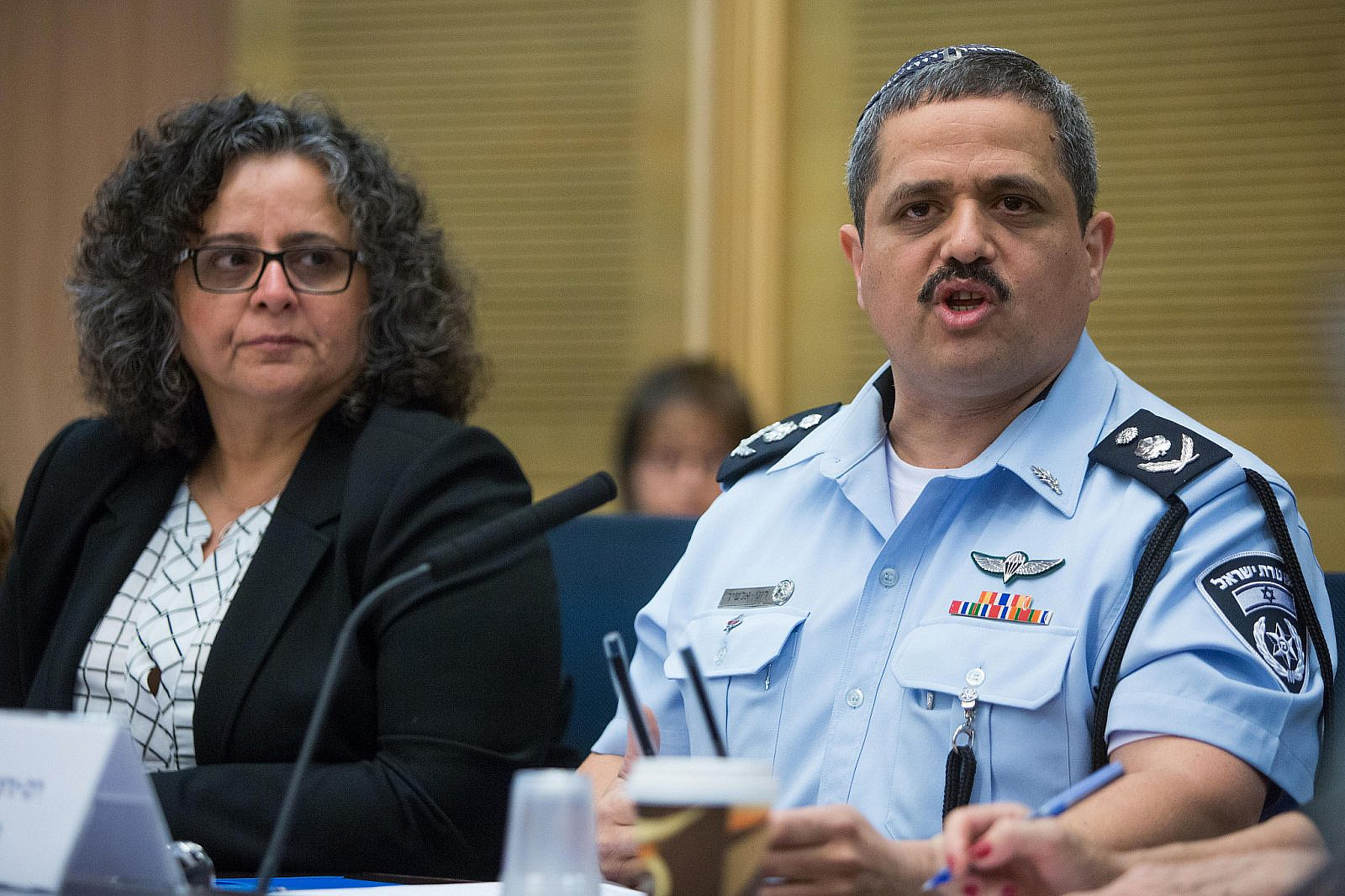 |
Joint List MK Aida Touma-Sliman and Israeli Chief of Police Roni Alsheikh attend a Status of Women Committee meeting regarding sexual harassment in the Israeli police at the Knesset, March 29, 2016. (Yonatan Sindel/Flash90)
“For years the state has related to our society as the backyard of the country,” she says. “For years the police were interested in us only in terms of security… The Israeli government looked at us as a source of danger to society.”
This attitude, she explains, created a situation of conflict and mistrust between the Israeli authorities and Arab communities, who do not see the police as an institution for law and order but as a tool of the security apparatus. When residents see police officers heavily deployed to carry out a demolition of a house that was illegally built, yet see no such action in the battle against crime, it breeds resentment; the fact that it is impossible for Arab families to even receive a building permit for their homes in the first place only compounds the matter.
These tensions between the police and the community escalated after October 2000, when Israeli police shot and killed 13 unarmed Palestinians in Israel during demonstrations against Israel’s actions at the start of the Second Intifada, explains Ola Najami-Yousef, co-director of the Abraham Initiatives’ Safe Communities program, which works to facilitate better and equal policing in Arab localities.
Although the government-appointed Or Commission determined that there had been no justification for the police’s use of live fire, no officer has ever been indicted in the cases. In 2007, the Israeli attorney general closed the investigation files.
“After October 2000, the police just left the Arab communities,” says Najami-Yousef. “Police met Arab citizens only in situations of conflict and situations of oppression, creating mistrust between the community and the police.”
Dealing with this situation requires treatment of the structural conditions that foment violence, emphasizes Ruth Lewin-Chen, Najami-Yousef’s co-director of the Safe Communities program.
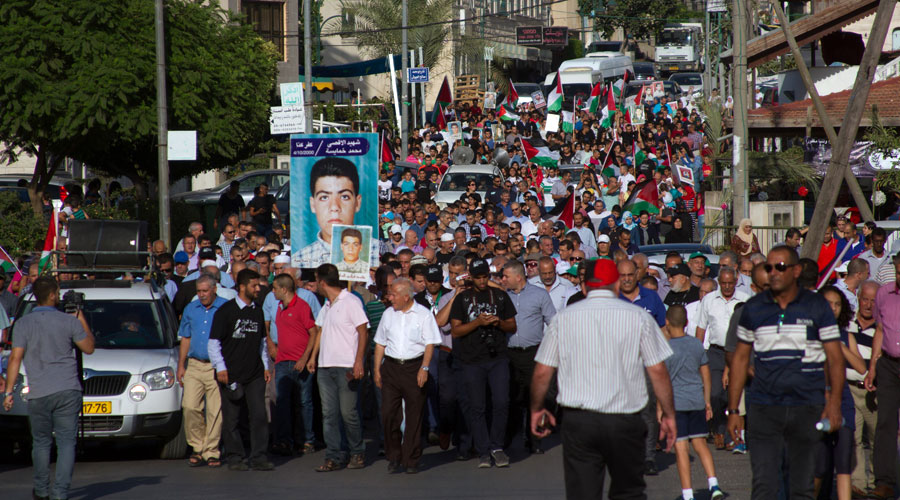 |
Palestinian citizens of Israel march to commemorate the killing of 13 protesters by Israeli police in October 2000, Sakhnin, October 1, 2015. (Omar Sameer/Activestills.org)
“Even if the police were perfect and the Justice Ministry was doing an amazing job, we would still have crime and violence in Arab society,” says Lewis-Chen. “This phenomenon is a result of root causes, such as no land to build on, no permits to build, poverty, high unemployment, no access to bank loans,” all of which become major sources of conflict and anxiety between families and gangs. “Of course, the police and justice system have a major role to play in solving crimes and making sure criminals go to jail for a long time — but there are these deeper issues,” she adds.
‘An incubator for crime’
To address the increasing violence, there needs to be a combined effort by the police and the Ministries of Welfare, Education, Finance, Internal Security, and Interior, argues Najami-Yousef.
“If you realize that almost none of these government services exist in villages and the only one who gives services is the police, you see that the [Palestinian] community relates to Israeli society only through the police,” she says. “The government has to provide solutions on all fronts.”
A five-year economic development plan to channel NIS 12-15 million into Arab localities is now coming to a close, says Lewin-Cohen, but very little of the funding actually reached its intended purpose. This, she says, was in part due to local government mismanagement, sometimes because local mayors were threatened by criminal elements demanding job contracts, and partially because the master plans for the towns and villages have still not been approved.
In addition, rather than using the COVID-19 pandemic to engage and build trust with the community, police presence has become even more of an enforcement agency, says Lewin-Cohen. “The police are much more present in Arab towns now, and give fines to people not wearing masks, but the shooting, killing and violence continues as usual. People see that the police can give fines and prevent them from going to one town to another, but they are not solving crimes, they are not stopping the shooting.”
When the police clamped down on organized crime families in Jewish communities in the early 2000s, explains Lewin-Chen, the families did not disappear but rather just moved into Arab communities where police are less present. Though the police say they are focusing on fighting organized crime in Arab towns, the results are hard to find.
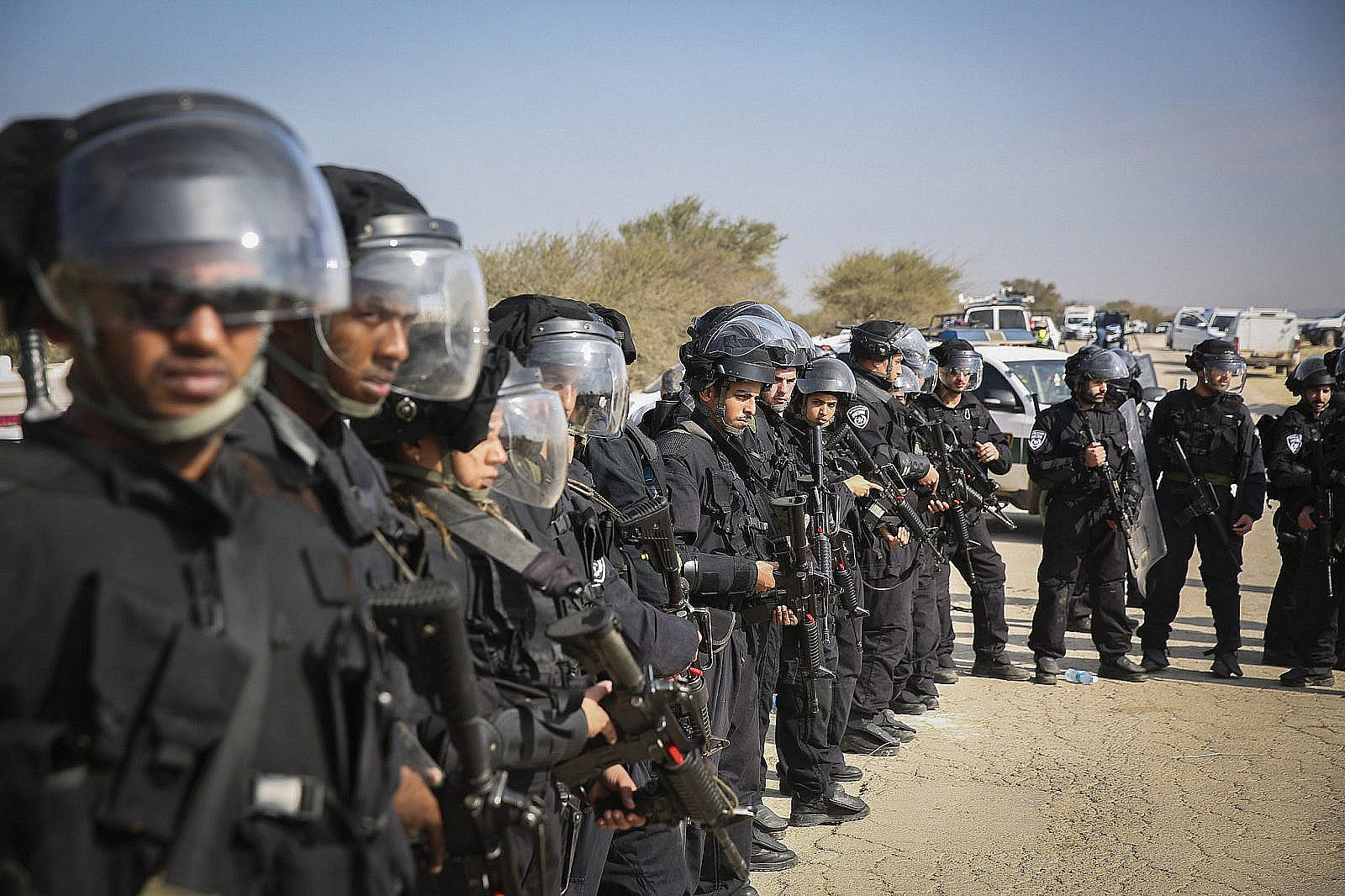 |
Israeli police guard during the demolition of homes in the Bedouin village of Umm al-Hiran in the Negev, southern Israel, January 18, 2017. (Hadas Parush/Flash90)
“We are talking about Israeli citizens,” says Najami-Yousef. “No city or village in the Arab community is safe from violence and crime. The status of the community has no influence on whether there is violence or not… all of us live in the same situation.”
In a phenomenon common to many communities in the world suffering from neglect and poverty, most people involved in crimes tend to be young people between 18 to 25 years old, notes Irsheid of Gun Free Kitchen Tables. With poor educational or employment prospects, they make easy recruits for crime families, she explains. And when police do make arrests, it is of these “foot soldiers” rather than the kingpins who are really in control, she adds.
“In this situation, the society is an incubator for crime. The state created the conditions… and with years of neglect and weakening an entire community, they made it ripe for crime,” says Irsheid.
Militarized society
Two state-run campaigns were carried out in recent years to collect illegal weapons from Arab communities in Israel. But they were destined to fail, according to Irsheid, since they were scheduled to last for only 10 to 14 days. Similar campaigns in other countries have shown that in order to be successful, they should be carried out for at least half a year, she explains. Najami-Yousef, who visited 40 of the collection sites with Lewin-Cohen, also found that many of them did not follow the requirements to ensure anonymity.
“The number of weapons given back in this way was very small. It was useless; it was lying to people in their face,” Irsheid says, adding that in the last campaign, many Jewish-Israelis whose gun licenses had expired also took advantage of the opportunity to turn in their unregistered weapons.
Activists say that while some of the illegal weapons come from Palestinian dealers in the West Bank, the majority of the guns in fact come from the IDF and the police — a fact that is known by police.
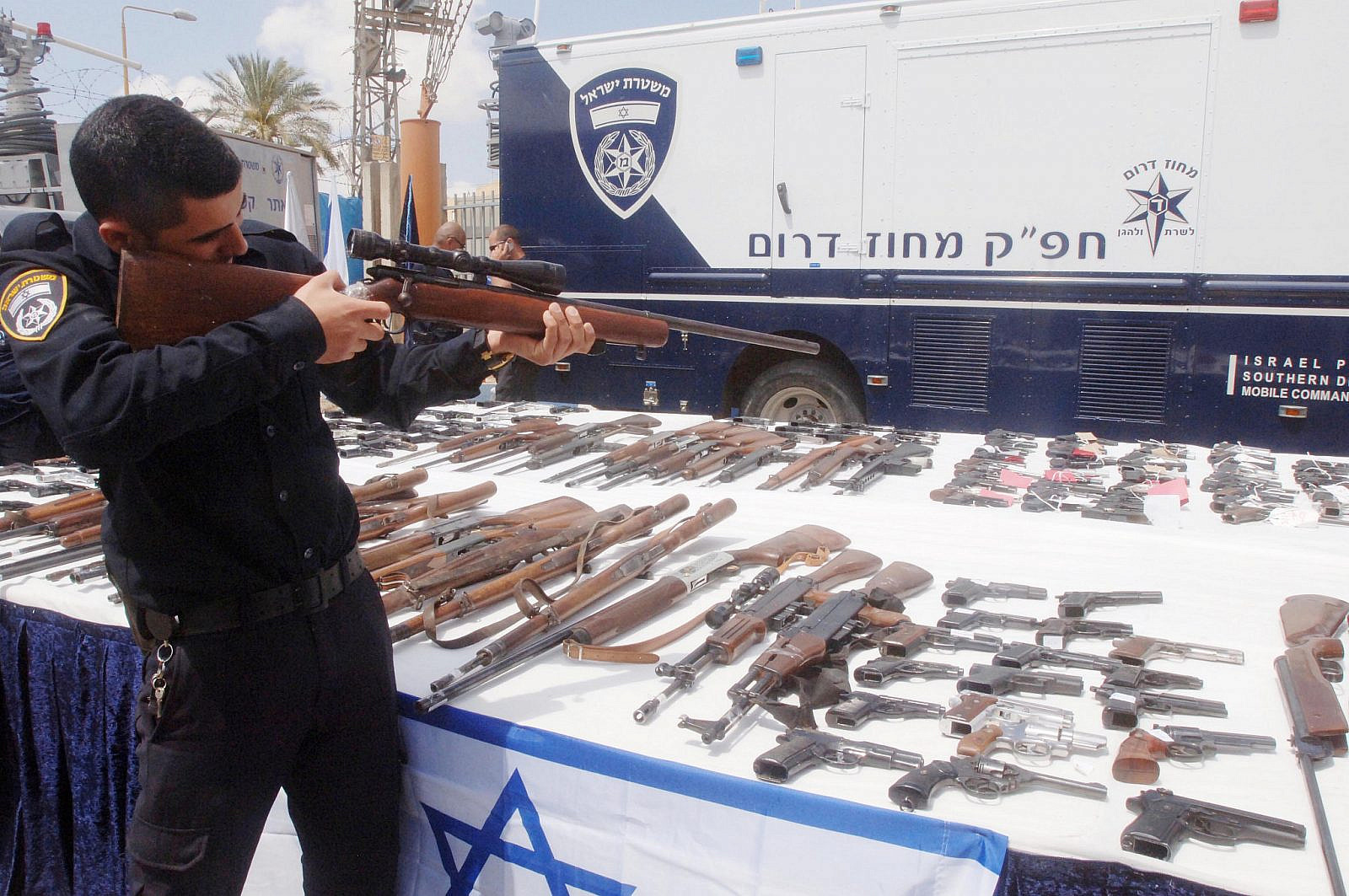 |
Illegal firearms seized by Israeli police during ‘Operation Law and Order,’ seen on display at the Police Southern District, April 10, 2014. (Flash90)
“By differentiating between [legal and illegal weapons], we are losing the point,” explains Irsheid. “Militarizing the Israeli community means there are more weapons [in general], which clearly leads to more weapons in the Palestinian community in Israel too. If we reduce the number of legal, licensed weapons in the Jewish community, we would definitely see a reduction of weapons in the Palestinian community.”
According to Israeli police spokesman Micky Rosenfeld, the authorities are in fact working with Arab community leaders to curb the violence, including through joint seminars organized with the Abraham Initiatives, and he sees a “significant opportunity” to tackle the issue. He believes that half of the crimes can be prevented with this sort of cooperation.
Rosenfeld says that they have increased the number of police stations and police presence in Arab communities to prevent the use of illegal weapons, which he claims is the source of much of the violence between rival families. He added that there are ongoing investigations to find concrete evidence in these cases, but charged that the families themselves often clear up the evidence before the police arrive, making it difficult to carry out their work.
“We see very, very few cases actually getting to court,” says Lewin-Cohen, noting that people are sometimes charged for lesser crimes, such as illegal possession of weapons or obstruction of investigations, rather than murder. “It’s very problematic to claim they don’t have evidence and that Arab citizens aren’t cooperative. We say there should be more use of technological means, and if police protected people in Arab communities, there is more chance they would be willing to give testimony.”
‘How can they live like that?’
Still, says Rosenfeld, there has been more emphasis on community policing and more Arabs have been hired by the force, including women. “A few years ago there was no police presence unless they were called in. The situation is improving and no doubt it will continue to improve.”
 |
Scene of the murder of Ashraf Abu Qa’od, Jaffa, December 2018. (Oren Ziv/Activestills.org)
Najami-Yousef says that the Abraham Initiatives is also working to raise local awareness within the Arab community. One of their focuses is on municipal elections, emphasizing the importance of voting based on the candidates’ abilities and platforms rather than on who belongs to the largest or more powerful families.
Since the municipalities are often the biggest employers in towns, who gets elected can be of vital importance and one of the key causes of violence, as families and crime bosses fight for control over jobs and lucrative contracts, explains Lewin-Cohen.
The villages of Kfar Manda, Tzuran, Tu’ran, and Yarka continue to experience violence even three years after local elections, with two murders in Tu’ran this year and one last year, says Najami-Yousef. At least 10 Arab mayors have had their lives threatened, some of whom are considered high risk by police, adds Touma-Sliman.
“Do you want to tell me the police don’t know who the people behind this are?” says Touma-Sliman. “If they are really not able to [find out] with all the technology they have and all the capability they showed in smashing organized crime in Jewish communities, then maybe they should all resign. As long as 80 percent of murders [in the Arab communities] remain unsolved, there will continue to be violence because no one is paying the price for it. You can see families [of victims] suffering as they see the murderer walking around freely. How can they live like that? Like Muna Khalil?”

